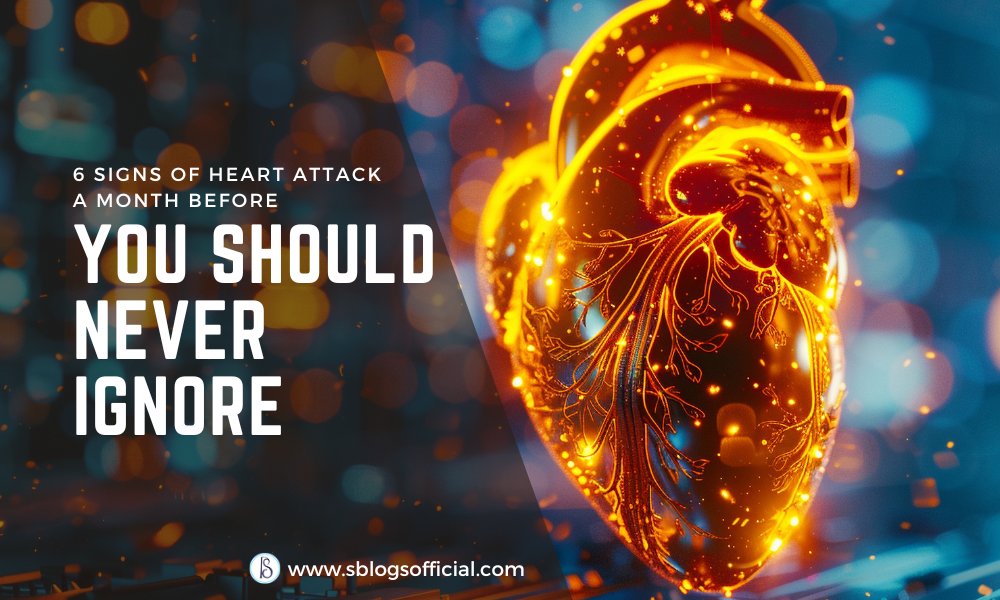
Heart attacks can strike suddenly, but most people experience warning signs weeks before. Recognizing these signs can help save lives. If you notice any symptoms a month before, it could be an indicator of an impending heart attack. In this blog, we will discuss the 6 Signs of Heart Attack a Month Before You Should Never Ignore.
This post covers the 6 key signs you need to look out for in both men and women, as well as important information about how heart attack symptoms differ based on gender.
Why Recognizing Early Signs Matters
Heart disease is the leading cause of death worldwide. Detecting the early signs of a heart attack could drastically improve your chances of survival. According to the CDC, nearly 47% of heart attack deaths happen outside the hospital, which suggests that many people ignore early warning symptoms.
Knowing these signs can make the difference between life and death. When treated early, heart attack outcomes improve dramatically, reducing the damage to the heart muscle and boosting recovery chances.
Common Early Signs of a Heart Attack
Many of the warning signs of a heart attack don’t happen suddenly. In fact, symptoms can begin weeks before the actual event. Let’s go through the 6 signs that may appear in both men and women.
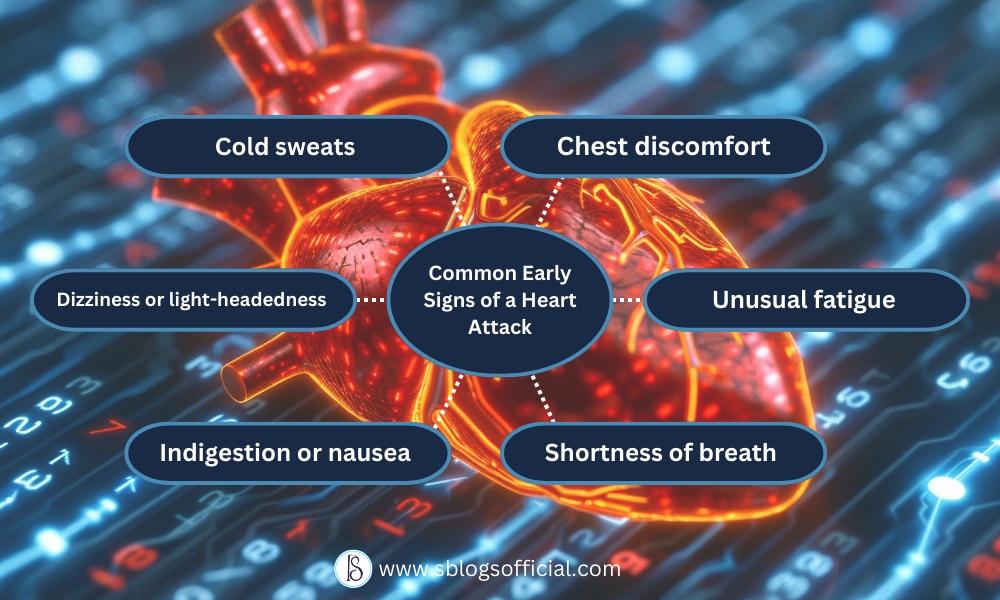
· Chest discomfort
This includes pressure, squeezing, or fullness in the chest. It may come and go.
· Unusual fatigue
Feeling exhausted, even with minimal activity, is a common precursor.
· Shortness of breath
Difficulty breathing during regular activities or while at rest.
· Indigestion or nausea
Some may experience stomach discomfort that feels like indigestion.
· Dizziness or light-headedness
Feeling faint or dizzy, especially when coupled with chest pain.
· Cold sweats
Sweating unexpectedly, especially when at rest.
These symptoms can appear sporadically, making it easy to overlook them. The key is to note any changes from your normal health and seek medical help if something feels off.
6 Signs of Heart Attack a Month Before in Women
Women often experience different heart attack symptoms than men, and these signs can be subtler. Here are 6 warning signs to watch for
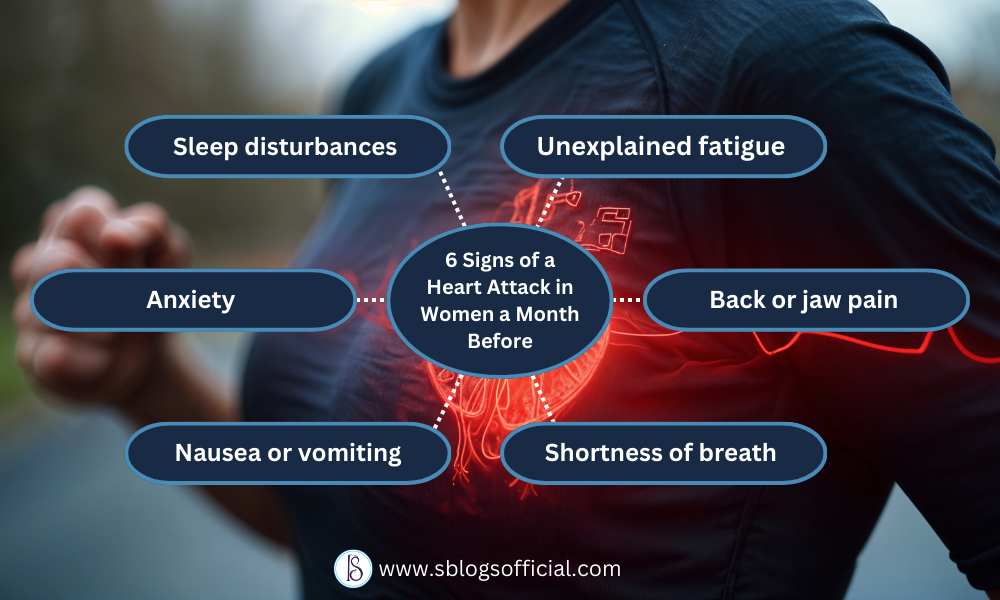
· Unexplained fatigue
Feeling extremely tired for no clear reason is one of the most reported symptoms.
· Back or jaw pain
Instead of chest pain, women may experience pain in the upper back or jaw.
· Shortness of breath
Feeling winded without much exertion is often more pronounced in women.
· Nausea or vomiting
Unexplained nausea that persists over time.
· Anxiety
A sense of impending doom or unexplained anxiety can be an early indicator.
· Sleep disturbances
Difficulty sleeping or restlessness, even if you’re tired.
These signs are often misinterpreted as non-heart-related issues, such as anxiety or digestive problems, which makes it crucial for women to understand and take action if they notice these changes.
6 Signs of Heart Attack a Month Before in Men
For men, heart attack symptoms may be more commonly linked to the heart itself. Here are 6 signs to look for
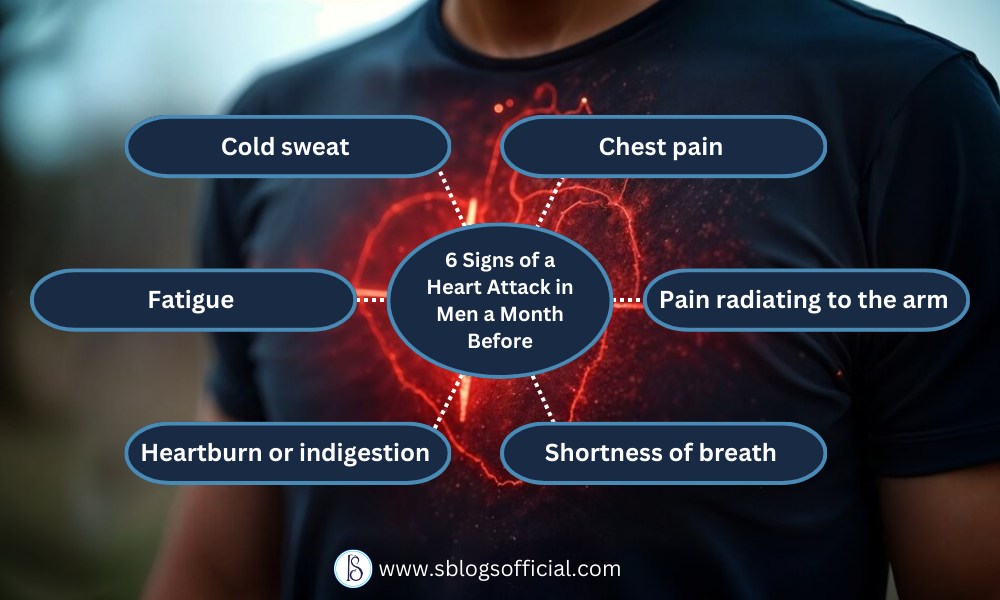
· Chest pain
A classic symptom, men often experience intense chest pressure or pain.
· Pain radiating to the arm
Left arm pain is a key warning sign for men.
· Shortness of breath
This can occur with or without chest pain, especially during physical activity.
· Heartburn or indigestion
Some men may mistake these as digestive issues.
· Fatigue
Unexplained tiredness or a lack of energy leading up to the heart attack.
· Cold sweat
Unexpected sweating, even without exertion.
These symptoms are often sudden and intense, but some can come and go in the weeks leading up to a heart attack. Men should also not ignore unusual discomfort that doesn’t resolve.
How to Respond if You Notice These Signs
If you experience any of the signs mentioned above, especially more than one at a time, take immediate action. Call 911 or emergency services without delay. Time is critical, and early medical intervention can reduce the severity of a heart attack.
If you’re with someone who’s showing these symptoms, don’t hesitate to seek help. Encourage them to chew an aspirin while waiting for emergency services, as this can help prevent blood clotting during a heart attack.
Prevention Tips to Lower Heart Attack Risk
Preventing heart attacks is always better than treating them. Here are some lifestyle tips to reduce your heart disease risk
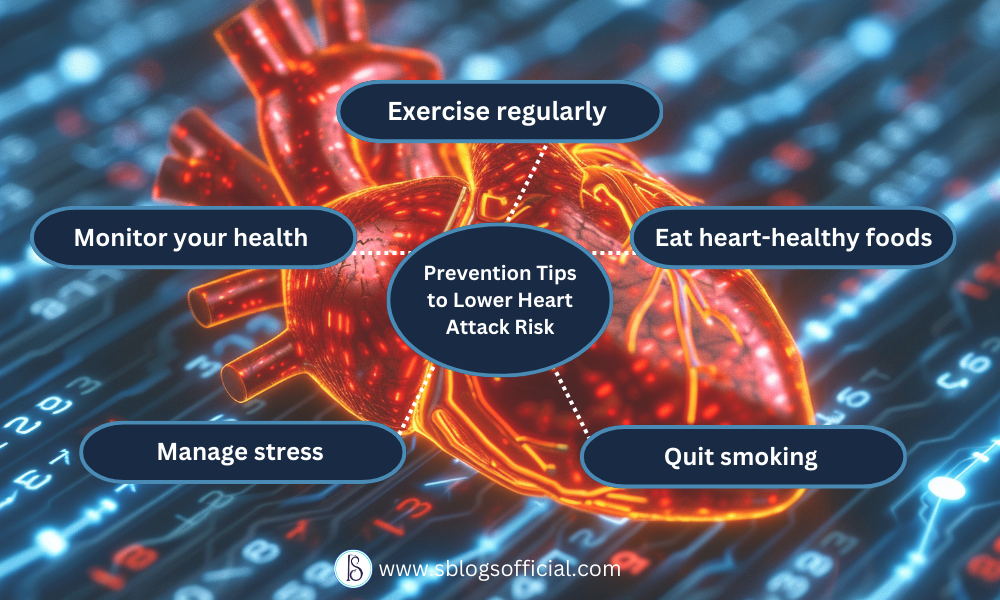
· Exercise regularly
Aim for 30 minutes of moderate exercise most days of the week.
· Eat heart-healthy foods
Include fruits, vegetables, lean proteins, and whole grains in your diet.
· Quit smoking
Smoking is one of the biggest risk factors for heart disease.
· Manage stress
High-stress levels can increase your risk of heart attacks.
· Monitor your health
Regular check-ups to monitor cholesterol, blood pressure, and blood sugar can help you stay on top of your heart health.
By staying active, eating right, and reducing risk factors, you can significantly lower your chances of having a heart attack.
Conclusion
Recognizing the early signs of a heart attack, whether in men or women, is crucial for timely intervention and can be the difference between life and death. The symptoms may vary between genders and often manifest a month before the actual event. By staying vigilant, understanding the key signs, and taking prompt action, you can significantly reduce the risks of severe complications or fatal outcomes. Always listen to your body, seek medical attention if you suspect anything unusual, and prioritize heart health through preventive measures like a balanced diet, regular exercise, and stress management. Staying informed is the best step toward prevention!
Looking for more insights on heart health and other wellness topics? Don’t stop here! Explore our other informative blogs to stay ahead on preventive care, health tips, and much more. Your journey to better health continues with us!
